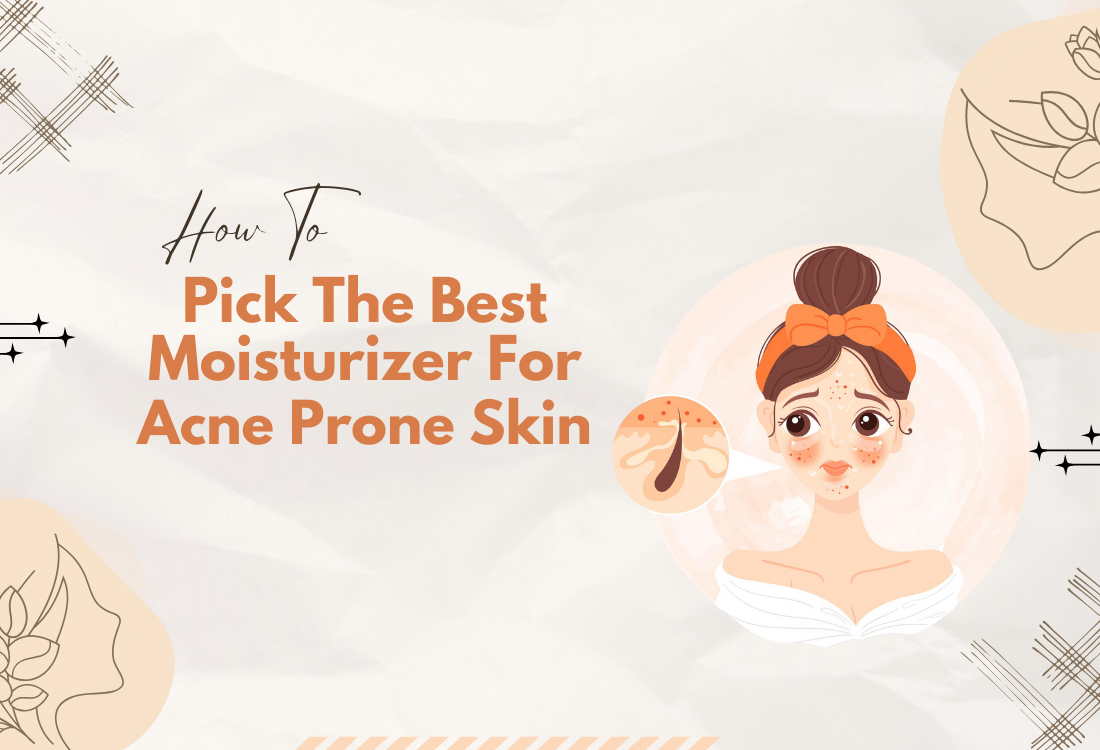Acne is one of the most common skin concerns all around the world, but that doesn’t mean it is normal. Acne, of any type, inflammatory or non-inflammatory, is our skin’s way of communicating that something needs to be addressed. It could be influenced by our diet, lifestyle, hormones, and many more factors. Acne-prone skin needs a more diligent approach when picking skincare products, as certain ingredients could trigger acne and breakouts, which is the last thing we want from our skincare products.
Therefore, choosing the skincare product that addresses our unique set of skin needs becomes paramount while dealing with acne-prone skin, since this blog is specifically about deciphering how to pick the best moisturizer for acne-prone skin, we would start with the most basic component of it which is choosing a Non-Comedogenic Moisturizer irrespective of what your skin type is. A non-comedogenic moisturizer is formulated with ingredients such as glycerin and ceramides that serve the purpose of hydration without eliciting breakouts of any sort.
Let us first understand the major causes of Acne
Acne is more common in people with oily skin types because excess sebum production in people with oily skin paves the way for increased bacterial growth and pore-clogging. However, all skin types may get acne and breakouts due to several factors, such as:
Dry and Acne-Prone Skin Moisturizer
Dry skin types are usually neglected when it comes to moisturizers that cater to both their skin needs, viz. Dry skin and Acne. Don’t let it get to you since for dry/acne-prone skin, folks should look for two labels on their moisturizer to keep acne at bay while providing ample moisturization too. They are non-comedogenic moisturizers and ceramide moisturizers.
Non-comedogenic moisturizer pertains to the formulation of a moisturizer such that it does not clog your pores and cause any further breakouts or comedones.
Ceramide Moisturizer pertains to the presence of ceramides in the moisturizer. Ceramides are naturally present lipids intracellularly in our skin that help maintain the integrity of the skin barrier and thus promote healthier, plumper skin health.

Oily and Acne-Prone Skin Moisturizer
Oily skin types have an unconscious fear attached when it comes to moisturizers, and usually, oily skin folks tend to skip moisturizers altogether, fearing further breakouts and greasiness that some moisturizers may cause. But moisturizer has always been a significant step in skincare since time immemorial, and for valid reasons.
Skipping moisturizer post-cleansing the face leads to transepidermal water loss since the natural oils are stripped off while washing the face, the sebaceous glands tend to make up for the loss of natural oils and get hyperactive and secrete excess sebum, leading to oilier, and greasier skin that paves way for acne and breakouts.
Now that the significance of moisturizers for oily and acne-prone skin has been established, let’s look for the ingredients and labels they should look for in moisturizers.
An ideal moisturizer for oily and acne-prone skin should be oil-free, lightweight, gel/water-based, and non-comedogenic, it becomes a game changer if they are formulated with additional anti-inflammatory, anti-bacterial, and soothing ingredients like sandalwood, pionin, ceramides, and aloe vera which further helps prevent and manage acne and acne marks.
Sensitive and Acne-Prone Skin Moisturizer
It becomes tricky for sensitive skin types to pick the moisturizer for their acne-prone skin as their skin may readily react to both actives and non-actives. Sheer diligence is required when choosing a moisturizer for sensitive skin from a very saturated market of moisturizers.
Also, let’s acknowledge that sensitive skin can be of either oily or dry type. It is largely a skin condition than a type, meaning, you can have oily/acne-prone and sensitive skin or dry/acne-prone and sensitive skin. Refer to the above segments on both while choosing your moisturizer along with these labels to avoid any chances of untoward experience with a moisturizer or any cosmetic product for that matter.
An ideal moisturizer for sensitive skin should be hypoallergenic, pH-balanced, oil-free, paraben-free, and silicone-free and should be formulated with soothing ingredients like ceramides, aloe vera, glycerin, and rose water (toning effect) that help nourish, soothe, and retain moisture in the skin.
Do not overthink it, this blog was to help you with an insight into choosing a moisturizer that suits your unique set of skin concerns and needs, moisturizer is one of the classical and essential skin care products that helps you protect and nourish your skin barrier, a strong skin barrier helps prevent and manage the bacterial, pollution-related acne, it may also help soothe the inflammatory acne, and a non-comedogenic moisturizer would help minimize the instances of closed comedones and thus, in turn, would have a check on non-inflammatory acne such as blackheads or whiteheads.
Bottomline, choose the moisturizer for your acne-prone skin diligently, and once you find your perfect fit, stick to it for healthier, happier skin.
Also Read- 4 DIY Winter Skincare That Actually Works




Leave a comment
All comments are moderated before being published.
This site is protected by hCaptcha and the hCaptcha Privacy Policy and Terms of Service apply.